#clown care
Text
Improper clown housing
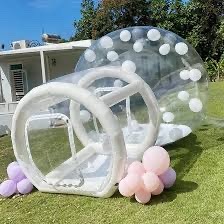
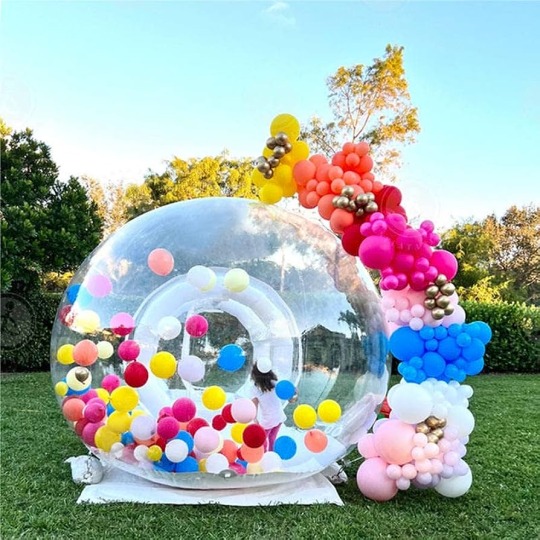
Enclosures like these do not provide the same comfort and safety that bouncy castles, and bouncy houses, and ball pits provide. Getting a bubble like this for your clown because “you like the aesthetic” is cruel. The see through bubble will make your clown feel improperly hidden or and safe which can lead to severe stress and panic attacks. This bubble will provide little to no enrichment for you clown. It can also be a hazard, some clown breeds have poor eyesight similar to how birds can’t see glass and have poor depth perception. This is why having brightly colored and padded walls such as in a bouncy house are crucial for the safety of your clowns. Clowns deserve a place to feel comfortable and safe. These bubble houses should not be used as a replacement for a bouncy house or ball pit. Sadly I have seen them be marketed as a two in one replacement for both. New clown owners need to be aware of this and steer clear of these.
#clowncore#clown husbandry#clownblr#clowns#clown posting#tambourine’s fantasy#clown care#know your clowns#stop clown miss information#stop clown cruelty
679 notes
·
View notes
Text
Public service announcement!
If you see a service/emotional support clown in public, DO NOT INTERACT!! I’m tired of hearing story after story from my friends about how someone was distracting their service clown. If they have a vest on they’re working, end of story! Don’t try to get them to honk, show you a magic trick, and especially don’t try to feed them. Just pretend like they’re not there. Thank you
#clown husbandry#clownblr#clowncore#clown care#clown biology#clown breeding#clown owning#clown help#clown#service clown#emotional support clown
948 notes
·
View notes
Text
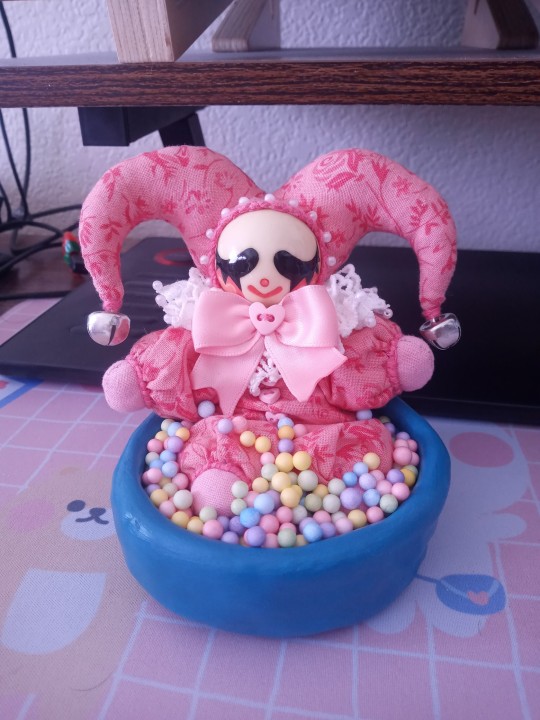
ball pit
669 notes
·
View notes
Text
is it okay to give my clown dr pepper? they've been making grabby hands at the can like they want some
633 notes
·
View notes
Text

There really is nothing like the feeling of being pressed against 28 other clowns in a confined space on your way to 7/11 <•: (•: > * • *
#clown care#clown husbandry#clownblr#clown posting#clowns#clown community#clown core#clowncore#clown#clownery
351 notes
·
View notes
Text
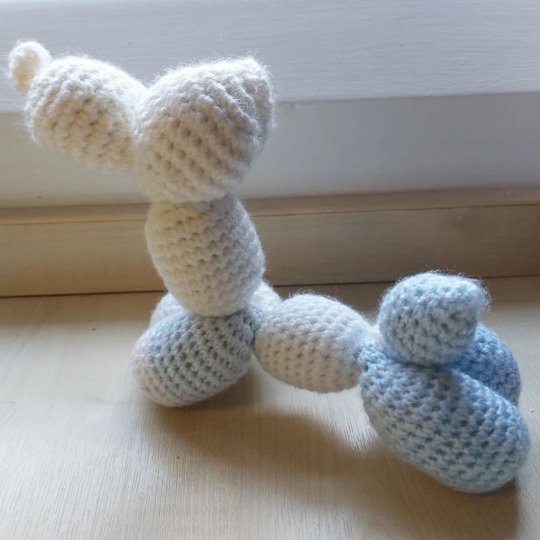
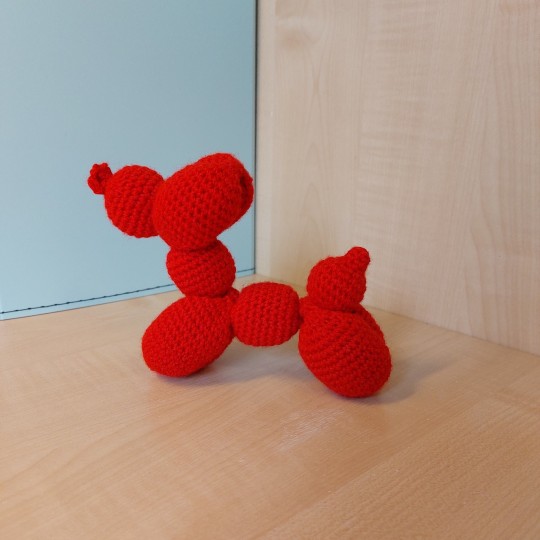

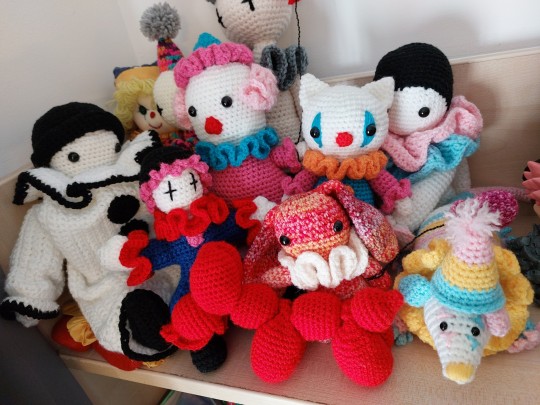
Balloon doggos
523 notes
·
View notes
Photo

Clown Breeds
557 notes
·
View notes
Text
Fun fact for y'all- did you know that in the wild, the ancient ancestors of our modern Clowns were migratory? The original concept of a travelling circus was a very early attempt to exercise (or more correctly, manage) this strong instinct in their clown troupes.
But i've seen some handlers wonder about this before. Most wild clown species that are particularly social or form troupes will find a territory to settle in, perform their courtship rites, and generally stay in that range until they whelp their clownlings in the spring.
As autumn approaches, you may find your clown doesn't quite have the same need for extensive zoomies and may grow a little more docile and affectionate with you and any other clowns in your troupe. Naturally they still need plenty of exercise- its no excuse for slacking on walkies and acrobatics!- and of course any unusual lethargy and lack of interest in things is always worth a trip to the vet's. But try not to panic too much if your troupe are less sprightly in the run up to the equinox.
#clown husbandry#clownblr#clown care#unreality#tw unreality#cw unreality#its been so long since my last clown post but this thought just hit me like a truck#please ask me about coulrology
307 notes
·
View notes
Text
My clown Clover in her tent and yes I know she needs a playmate I’m working on it lol
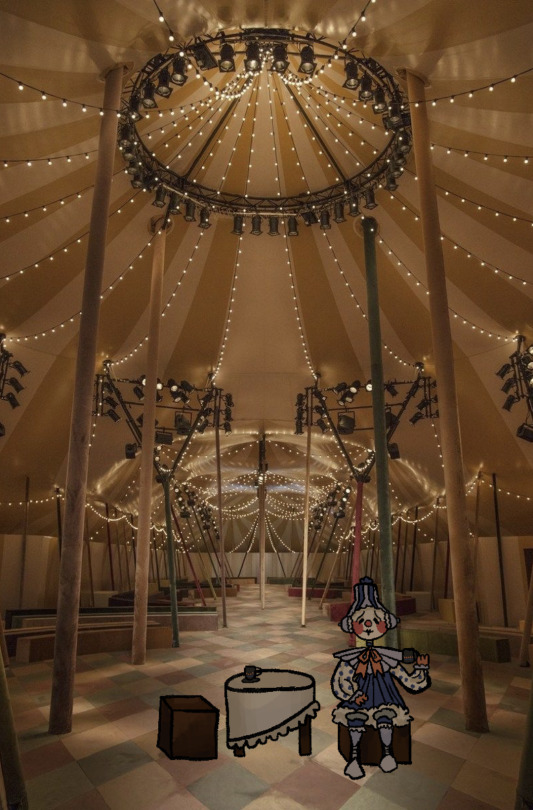
#clown husbandry#clownhusbandry#clown#clown care#clownblr#original art#ocs#oc art#pierrot#Sweets British Clown#clover
212 notes
·
View notes
Text
Tea Time
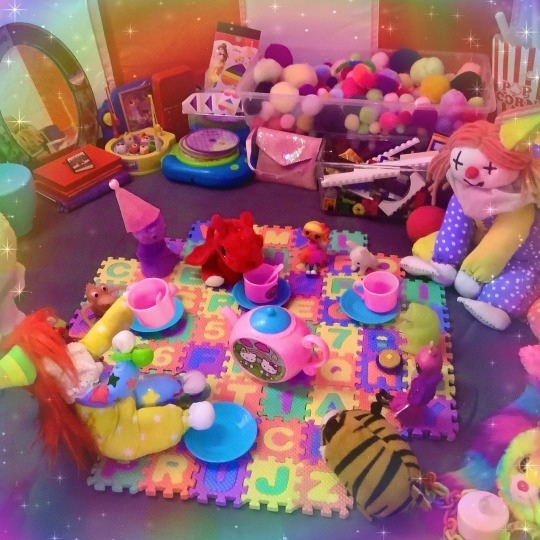
Party clowns obviously enjoy tea parties by nature.
:o)
#clown husbandry#clownblr#clown posting#clowns#clowncore#clown#clown care#clown doll#corn the clown#Butterbean the clown#Corn and Butterbean
236 notes
·
View notes
Text
Caring for Your Comedic Companion: A Guide to Proper Clown Care
Creating a Clown-Friendly Environment: The Chuckle Chamber
Clowns thrive in environments that stimulate their comedic instincts. Before adopting your clown, ensure you have a dedicated space in your home for them, commonly referred to as the "Chuckle Chamber." If you cannot afford to buy a new enclosure, an old tent painted with stripes can keep your clown happy for the first few months. Equip it with a variety of colorful props, oversized shoes, and a well-stocked assortment of rubber chickens. Ensure the Chuckle Chamber is spacious enough for your clown to express its natural exuberance.
Nutritional Needs: A Diet of Delightful Delicacies
Maintaining a well-balanced and joy-inducing diet is crucial for your clown's health. Offer a mix of cotton candy, popcorn, and custard pies to meet their nutritional needs. For hydration, a continuous supply of seltzer water is recommended. Regularly check for any allergies or sensitivities your clown may have to certain treats. Surprisingly, peanut allergies are common amongst certain breeds of clown.
Exercise and Enrichment: Laughter Workouts
Clowns are energetic beings that require regular exercise and mental stimulation. Engage your clown in laughter workouts, which can include juggling sessions, pratfall practice, and balloon animal sculpting. Introduce new comedic routines to keep their minds sharp and their spirits high.
Grooming: Maintaining the Mirthful Mane
Clown grooming is not just about appearance; it's an essential aspect of their well-being. Regularly check and clean oversized shoes to prevent slips, trim colorful wigs to maintain their vibrant allure, and ensure that the iconic red nose is kept in pristine condition. A well-groomed clown is a happy and confident one.
Veterinary Care: Honk-Checked Health Checks
Regular visits to a certified clown veterinarian are crucial to monitor your companion's health. These professionals specialize in honk-checked health checks, ensuring that your clown is in peak comedic condition. Vaccinations against gloom and routine screenings for joke deficiencies are standard procedures.
Socialization: Playdates with Fellow Funnymakers
Clowns are social beings that thrive on interaction with their own kind. Arrange playdates with fellow clowns to encourage socialization and the exchange of humorous antics. Attend clown conventions, where your companion can partake in the grandeur of collective laughter and collaborative performances.
Understanding Non-Verbal Communication: Mastering the Art of Clownish Signals
Clowns communicate primarily through non-verbal cues, such as honks, squeaks, and exaggerated gestures. Pay close attention to your clown's signals to gauge their mood and preferences. Understanding the art of clownish communication is key to fostering a strong bond with your comedic companion.
Celebrating Special Occasions: Clown Birthdays and Anniversaries
Marking special occasions in your clown's life adds a touch of festivity to their existence. Celebrate birthdays with a clown-sized cake and a chorus of joyous honks. Recognize adoption anniversaries with a memorable performance or a specially crafted routine to commemorate the time spent together.
Providing proper care to your beloved clowns is not just a responsibility but a joyful journey of shared laughter and merriment. By embracing the unique needs and whimsical nature of your clown companion, you'll cultivate a bond that transcends the ordinary, creating a lifetime of cherished comedic moments.
#clownery#clowncore#clown posting#clown art#clown#clown husbandry#Clowns#Unicycles#Parties#Pranksters#Jesters#Mimes#Clownblr#Clown care#Clownology#Clownologist
114 notes
·
View notes
Text
Senior clown diet


Once your clown has started getting older you’ll notice that they will have less of an interest in their normal food. Older clowns will start getting weaker jaws and some clown breeds will even have teeth fall out. Normally this happens to your average hobo and circus clowns. That’s why jello can be perfect diet for your older clowns. It is very important to change their diet to better suit their new needs. Jello is fantastic because it’s gentle on their teeth and jaws. Popcorn and rats can hurt their fragile teeth easily and jello provides all of the nutritional value necessary for your clown.
#clowncore#clown husbandry#clowns#clownblr#tambourine’s fantasy#clown posting#clown core#clown care#clown info#know your clowns#clown
486 notes
·
View notes
Text

Sibling bonding out in the wild 😁
#clown#clown doll#clown husbandry#clownblr#clowncore#clowns#clown posting#clown blog#clown pet#clown care#georgieclown#todneyclown#francisclown
176 notes
·
View notes
Text
STORYTIME: DO NOT FEED YOUR CLOWNS THIS!!
I volunteer a few days a week at a clown shelter. Earlier this month, a Teacup-Birthday mix named Kiki was adopted by a (seemingly) very nice middle aged couple, and we were very happy to send yet another clown to a good home. But disaster struck this afternoon when the couple returned to the shelter, wanting to surrender Kiki back to us. Their reason? She was not performing any tricks and had been biting them nonstop for weeks now. I was of course very shocked and confused by this. Kiki was one of the most playful and least temperamental clowns I had ever cared for.
I asked them if she had the proper environment, if they had changed her costume or markings in any way, if they were feeding her the proper diet. They said that they were doing everything right, and were following the care instructions we had given them. I usually give people the benefit of the doubt, but their story just wasn't adding up. And they were shifting nervously, and talking quietly to each other when they thought I wasn't looking. I told them to wait while I took Kiki for a checkup. As I took her to the vet's office, I couldn't help but notice that she seemed to lack any energy at all. When I tried to tickle her stomach (something that she normally loves), she snapped at me (Luckily, I jerked my hand away before she could bite).
When the vet examined Kiki, it was revealed that she was suffering from malnourishment and a button infection. I went back out to talk to the owners, and they continued to deny any mistreatment. After some more questioning and prying, they finally broke down and admitted what they had been doing.
They had been feeding Kiki a mix of mice and small bones (no problem there). But for her candy intake, they had been feeding her SUGAR-FREE candy. My heart sank as soon as I heard those words. No wonder Kiki had been so sick.
Every clown owner should know that (in general) Clowns need a healthy mixture of raw meat and sugar in their diets. Feeding them sugar-free stuff can be very bad for them and cause a LOT of problems.
For one, they will not be getting their much needed sugar intake. A sugar deficiency will lower their mood, make them more easily agitated, make them sick, and can even be deadly for some clown breeds (such as Birthday and Circus). As Kiki is a Birthday clown, she might not have survived another week without sugar.
Another thing to keep in mind about sugar-free products is that they often have artificial sweeteners in them. These sweeteners are not ideal for clowns, as most clown breeds have sensitivities or allergies to them. Simply put, most clowns' digestive systems are not properly built to process sugar-free foods. Feeding your clown artificial sweeteners over time can even weaken their immune system (This is likely what contributed to Kiki's infection).
The owners claimed that they had no idea that sugar-free candy was bad for clowns (very unlikely since the care instructions specifically list sugar-free foods under the "DO NOT" section). My boss suggested to them that we take care of Kiki for a few days, but they told us they weren't coming back. As soon as they left, we informed other local shelters about them and even posted on internet forums about it, as they may go somewhere else and find a different clown to mistreat. They clearly only see clowns as entertainment and nothing else.
We gave Kiki some cotton candy, and she's already starting to return to her old self. Unfortunately, though, this means that she's back in the system. There's no telling how long until she's adopted again.
Before anyone asks, we make sure to look into anyone who's interested in adopting one of our clowns. We run background checks, call character witnesses, make sure they have the proper environment for a clown and have the money to support one, etc. Overall, the process takes about a month or so. Sometimes it can take even longer if we have a waiting list. It is extremely rare that a clown adoption goes wrong. In fact, this is the first time it's happened in the year I've been volunteering here.
TL;DR
Don't feed clowns sugar-free foods! It can make them very sick and cause a lot of complications.
#dont feed your clowns sugar-free candy#clown husbandry#clown posting#clowncore#clownery#kiki the clown#clown care#clownblr#pet clown#my post
272 notes
·
View notes
Text
I am sick and tired of people walking around without their clowns on a leash.
The amount of clowns that are hurt daily from other clowns attacking them or from wondering out into the street to show their owners a trick is ridiculous.
I do not care how well-behaved your clown is or how friendly they are, it is no guarantee that another clown is as friendly as yours is and may attack your friend. You'll be able to pull your clown to safety faster if they're attached to a leash and this also prevents them from wondering off and getting hurt.
Leashing isn't just for clowns who are not well trained or not well behaved. It's also for the safety of your own clown.
#clown husbandry#tw unreality#clownblr#clown care#clown#clown posting#clowncore#Keep your clown leashed
232 notes
·
View notes
Text
I guess I have a jester now???
Lollie-pop, my party/scare mix has a little boyfriend!
A little purple and yellow jester has been hanging out around my clown's outside play area for months now. He has finally decided to come in and he is not leaving. Not that I want him to. He is an adorable little sweetheart! And Lollie-pop is so cuddly in a way I've never seen her with anyone before.
So... any tips on raising a jester?? Anything is appreciated!!
#tw unreality#clowncore#clownblr#clown#circuscore#clown oc#clown posting#clown husbandry#clowns#clown care#jester#jester care#new clown
275 notes
·
View notes